Dye transfer from leather
Occasionally dyes from leather garments (jackets, trousers, gloves, belts, bags, shoes) rub off and discolour other materials. Sometimes it's just fluff from suede or nubuck, but often it is caused by dyes which have not been sufficiently fixed to the leather.
The surfaces of suede or nubuck are sanded in the manufacturing process. The resulting abrasive dust cannot be completely removed and rubbing with a light cloth over suede or nubuck will always leave a slight discolouration caused by loose leather fluff on the surface. But that is usually significantly less than the colour released by leather dyes.
Pull-Up leather and other oiled or waxed leathers are often treated with a tinted, wax-like shoe polish. Such leathers therefore always discolour slightly. Warm and humid weather cause the waxes and fats to melt leading to stronger dye transfer. This is not a big issue with shoes as they do not often come into contact with sensitive surfaces, but it often occurs with oiled and waxed bag and furniture leather.
Strong discolouring leash and leather handbag.
A leather shoe with colour that rubbed off inside. - A leather jacket showing discolouring on the outer surface.
It is common to find dye transfer from belts on car leather interiors, colour from leather jackets on furniture leather or leather bags transferring colour onto the clothes with which they come into contact and colourful socks can discolour the inside of leather shoes.
Discolouration from brightly-coloured sandals bought for 10 euros. A quick rub test with a lightly damp cloth revealed the issue immediately (06/13).
Minimal discolouration may occur with new leathers, however, strong discolouration and discolouration from contact with other materials are not acceptable. The colour fixation is determined in laboratories through rubbing tests. However, there is a simple test anyone can do. Take a dry white cloth and rub it 10 times over the marked area and then again 10 times with a damp rag. Are there any visible discolourations when rubbing with the dry cloth? Then the leather has strong discolouration. Slight discolourations when rubbing wet can be accepted. Make the same test with comparable leather objects. When the resulting discolouration is too strong, the quality of the leather is not good enough.
Strong colour bleeding from a blue suede jacket during the cleaning process.
Some manufacturers of leather objects warn against discoloration by placing labels on the leather object or in the accompanying information material. In the case of slight discolouration, this is a useful and helpful indication. In the case of severe discoloration or information in the "small print", it will not be sufficient to exclude liability.
'Warning notice in leather boots: Warning of possible discolouration.
Where there is very severe discolouration, you should return the items to the shop. Show them the test results. In difficult cases seek help from a consumer advisor or lawyer. Frequently the manufacturer recommends using hairspray, waterproofing or vinegar to fix the colour, but this won’t always work, and it's not your job to do this. Leave that to the seller of the goods. Most of the trade take leather items back if the discolouration is significant.
In cases where a complaint or return is not possible, you must seek advice from a leather specialist. But not every case is retrievable.
Markings on car seat leather from leather belts.
Marks left by the back of a fur blanket on leather furniture.
Discolouration of leather and colour separation on leather.
Leather repair: Dye transfer from leather.
Extreme cases
A customer bought a medium-priced leather jacket. When applying leather care she noticed that the jacket was partially stained. On closer inspection, it turned out that the white sheepskin was first sewn together and then dyed grey. The colour corrections were done by the manufacturer in a colour that wasn’t an exact match, leaving it patchy. To make matters worse, the dye dissolves slightly when rubbed with a damp cloth.
Extreme case: This sheep leather jacket was first sewn and then dyed. Possibly incorrectly produced and then reworked manually with leather dye. The subsequent corrections are carried out with a leather colour that is not a good match.
Additional information
- Suede & nubuck shedding - Loose leather fluff
- Colour separation of leather
- Colour migration
- Dye transfer by clothing on leather
- Typical leather damages such as aging, fading, grease stains, discolouration etc.
![]() -> Help with staining of jeans on smooth leather
-> Help with staining of jeans on smooth leather







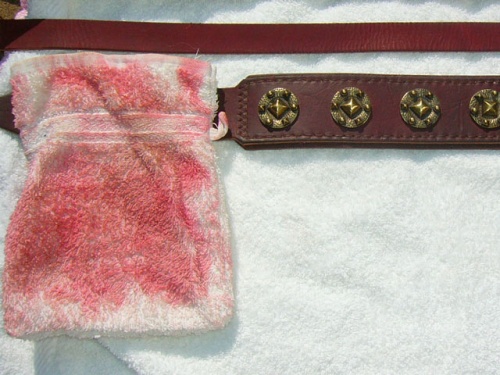



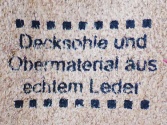
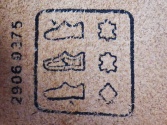











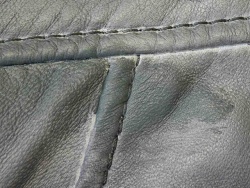
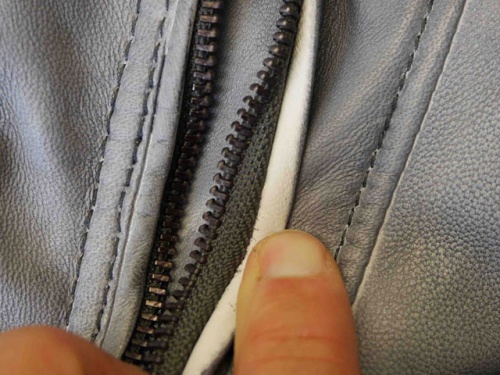

 a kotori web solution
a kotori web solution